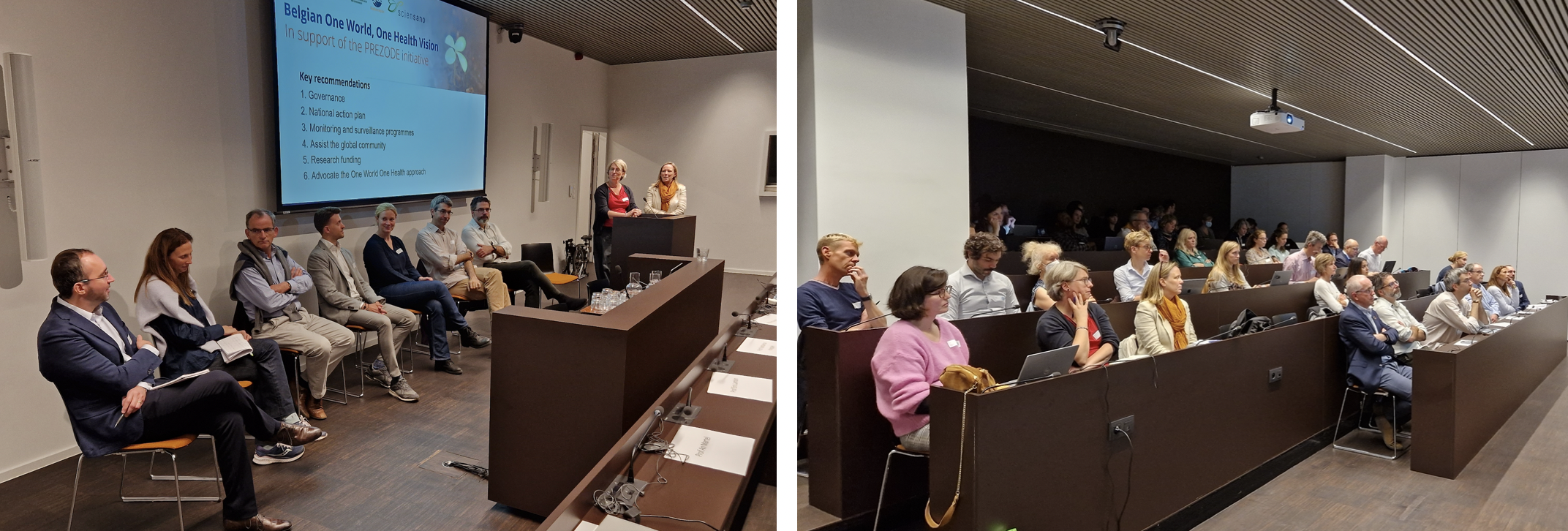
Belgian One Health Vision
The Belgian PREZODE Expert Group with support from the Belgian Biodiversity Platform, FPS Health, Food Chain Safety and Environment, and Sciensano held a last workshop on 6th October 2023 to discuss the development of a national 'One World One Health Vision' for Belgium, with a focus on the emergence of diseases of zoonotic origin.
Belgian experts from across sectors including biodiversity, human health, veterinary science, climate change, science policy, and scientific research, attended the workshop and contributed to the discussions towards a One Health vision for Belgium. At this final workshop, the organisers presented the 'One World One Health' final draft policy recommendations , which will be submitted to the Belgian ministers in November 2023. A panel discussion was organised with several key stakeholders, including:
- Prof. Eric Lambin, Faculty of Sciences, Earth and Life Institute, Centre for Earth and Climate Research, UCLouvain
- Mr. Arnaud Goessens, Associate Director, EU Policy, Wildlife Conservation Society EU office
- Prof. Katharina Kreppel, Emerging Infectious Diseases, Institute of Tropical Medicine
- Prof. An Martel, Faculty of Veterinary Medicine, Conservation and biodiversity, Wildlife and habitat management, UGent
- Prof. Steven Van Gucht, Virologist, Science Communicator and Government Advisor, Sciensano
- Prof. Nicolas Antoine-Moussiaux, Faculty of Veterinary Medicine, Veterinary Management of Animal Resources, ULiège
- Dr. Zeev Noga, Secretary-General, PREZODE Initiative
More information on the programme is available at www.biodiversity.be/6011
The final Belgian One World, One Health Key Policy Recommendations are available here.

Arnaud Goessens, Associate Director of EU Policy, WCS EU Office, shared WCS’s positions on One Health and highlighted the importance of protecting high-integrity ecosystems to reduce risks of future pandemics of zoonotic origin. The science is clear that pandemics of zoonotic origin, such as COVID-19, are directly related to the increased human/wildlife interface caused by land-use change, in particular deforestation and forest degradation; and urban markets mixing wildlife, people and domestic animals in ways that promote spillover. Recent studies show that the single most effective and cost-effective way to prevent pandemics is to avoid pathogen spillover to humans, wildlife, and other animals in the first place, referred to as pandemic prevention at source.
WCS has been a pioneer in promoting wildlife health as critical to saving wildlife and wild places. In 2004, WCS convened the first “One World, One Health” symposium in New York City, which was attended by health experts from around the world. The Manhattan Principles on “One World, One Health” were formalised and called for the recognition of “the essential link between human, domestic animal and wildlife health and the threat disease poses to people, their food supplies and economies, and the biodiversity essential to maintaining the healthy environments and functioning ecosystems we all require.”
In October 2019, WCS and the German Federal Foreign Office (FFO) co-hosted a “One Planet, One Health, One Future” conference in Berlin, as a follow-up to the Manhattan Symposium, which brought together members of academia, government, policy, and civil society from nearly 50 countries. The Berlin Principles on One Health were forged, updating the 2004 Manhattan Principles, which alerted of the potential devastating impacts of future pandemics of zoonotic origin.
READ MORE
Belgian One World, One Health Key Policy Recommendations
WCS and One Health
Pandemic prevention at source
Links between Ecological Integrity and Human Health
Best Practices to Confront Pandemics at the Source
WCS Recommendations to Reduce Pandemic Risk